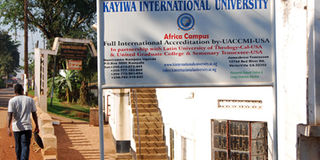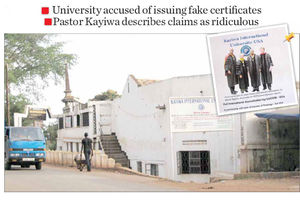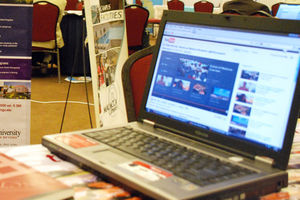
The Africa Campus of the Kayiwa International University.
Police yesterday arrested four academics to assist with investigations into the continued operation of Kayiwa International University, which the government closed in 2020.
Detectives picked the quartet from National Council for Higher Education (NCHE) offices on accusations of forging a letter that purportedly authorised the institution to resume operations.
The August 9, 2023 letter was reportedly authored by the NHCE Executive Director, Prof Mary Okwakol, who has since disowned it.
“We have never reinstated their licences, hence they are not supposed to admit or enrol any student. That is why we have handed the matter to police to explain where they got the forged letter,” Prof Okwakol said.
According to the forged letter, a copy Daily Monitor has seen, NCHE purportedly permitted the university to reopen.
“In accordance with section 98(3) of the Universities and other Tertiary Institutions Act, you have fulfilled the mandatory two years to seek for the reinstatement of the university operations,” part of the letter read in part.
It adds: “In line with the above, the provisional license is therefore reinstated under supervision of the quality assurance committee that will carry out due diligence on the matter.”
The above-forged letter with a signature similar to that of Prof Okwakol has different fonts.
According to NCHE, their official font is Times New Roman, but the forged document had Times, Times Regular, and Arial fonts despite having the signature of the body’s boss.
The NCHE had closed Kayiwa University in 2020 due to inadequate qualified academic staff, non-payment of staff salaries, low enrolment of students, non-payment of statutory obligations, and failure to constitute the university council.
However, a highly placed source said NCHE officials learnt about the institution’s plans to admit students based on the forged letter.
Meanwhile, the university has made a public call for prospective students to apply for a range of academic programmes for the 2024/2025 academic year, according to an advert running on its website (kintu.ac.ug) as of yesterday.
“We are receiving applications for 2024 intake in the departments of computer science and information technology, business administration and management, humanities and social sciences and education,” the advert reads in part.
The advertisement prompted NCHE officials to invite top university officials for a meeting, only to hand them over to CID officials.
The officials include the owner of the university, the vice chancellor, the chairperson of the university council, and the university secretary.
The NCHE officials first held a meeting with the university officials who denied the forgery.
Prof Okwakol, however, said the officials gave contradicting responses on the forged letter, with the university secretary indicating that a young man from NCHE delivered the letter while the vice chancellor said they received the letter through an agent.
Prof Okwakol yesterday said: “They should tell the police the name of the agent who delivered the forged letter from me. As far as I am concerned, the university does not exist.”
Before being handed over to the CID officials, the proprietor of the university said management did not receive formal communication about the revocation of their university’s licence.
“You indicate that you sent the revocation letter in 2020. However, the country was under lockdown due to Covid-19, and there was nothing at the institutions. We did not receive that communication officially,” the proprietor said.
NCHE officials dismissed this claim, saying that a letter, regarding the revoked licence, was received by the university secretary and was published in the Uganda Gazette and a newspaper.
Faced with mounting pressure, Kayiwa University officials requested guidance from the NCHE on the way forward.
Prof Okwakol of the NCHE indicated that the university would need to start afresh by applying for a letter of interim authority. This letter would permit them to establish necessary infrastructure, recruit qualified staff, and set up laboratory facilities, especially if they plan to run science programmes.
She informed the university management that NCHE officials were expected to visit the institution to ascertain whether or not it meets the set standards before the officials can apply for a provisional licence.
Prof Okwakol and her team exited the boardroom where the meeting was being held and invited CID officials to interrogate the university officials. The officials were later arrested and taken to a police station to make their statements.




